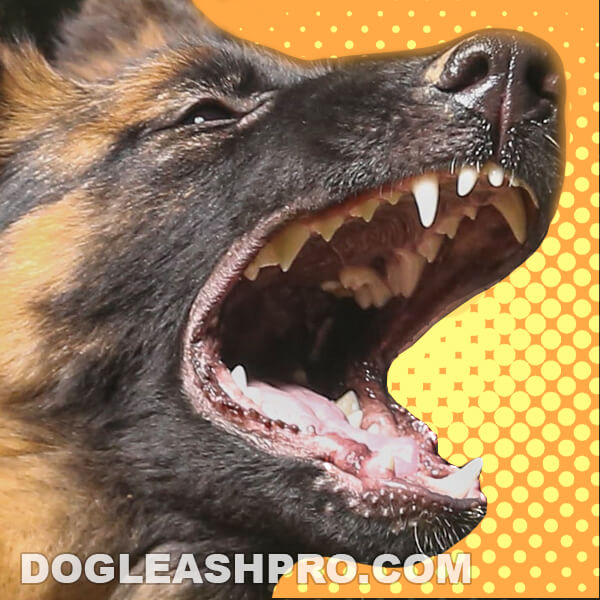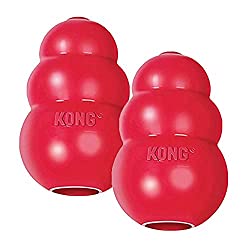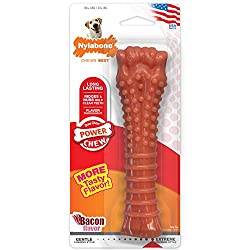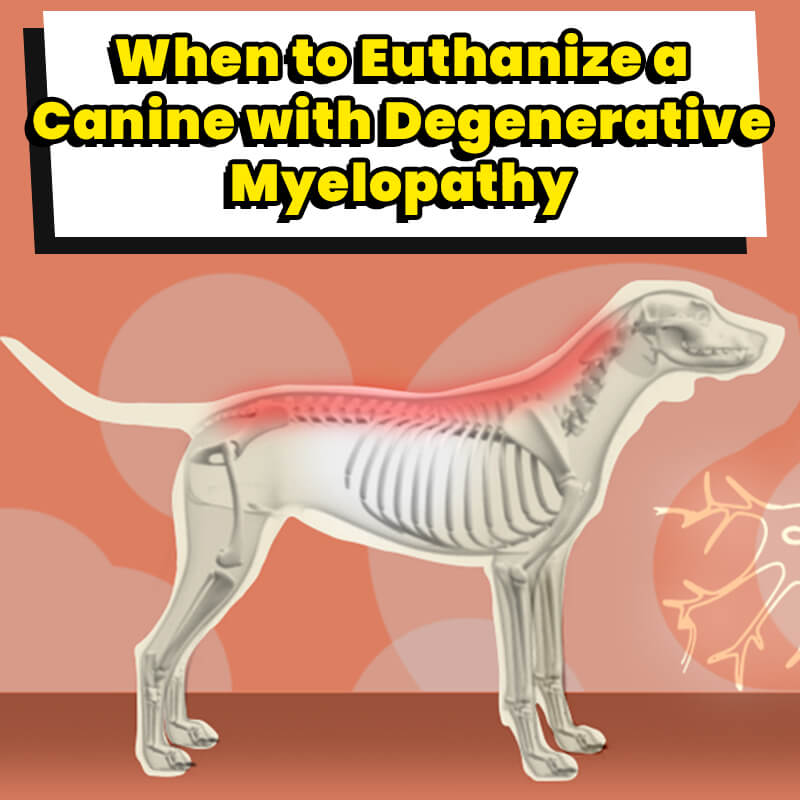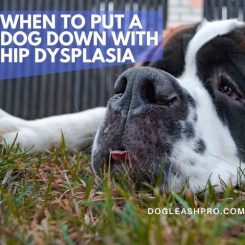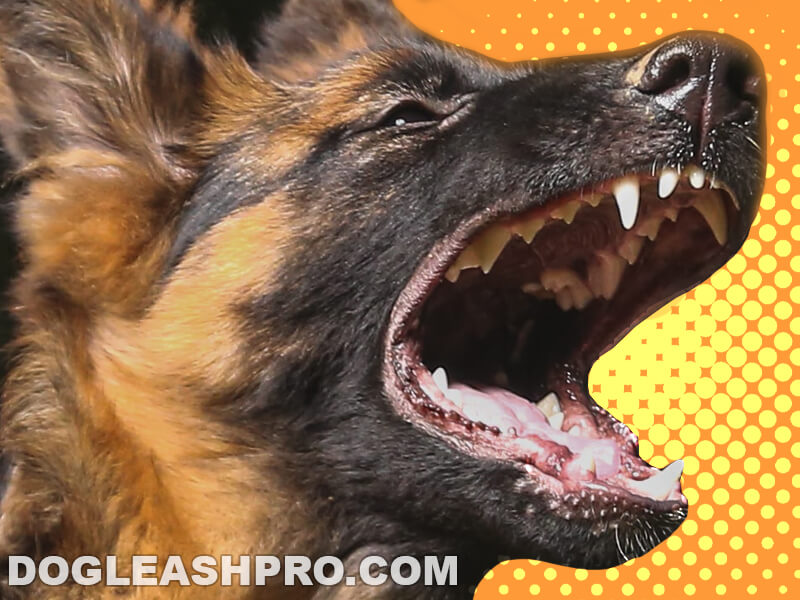
When I got my puppy, I would find small baby teeth on my living room carpet. I knew dogs go through the teething stage and they will want to chew everything they see.
My puppy would walk in circles around me while biting their chew toys. Today, I’ll discuss why the teething stage is crucial, what age German Shepherd puppies lose their baby teeth, what you can expect as an owner, how you can help them, and several ways to prevent them from chewing your most expensive shoes or furniture. Let’s begin!
Table of Contents
German Shepherd puppy teething stages
German Shepherd puppies start teething when their baby milk teeth fall out and their adult teeth start growing in.
During your German Shepherd puppy teething stages, you can expect small blood stains or spots on his or her toys. You may even find his or her small loose teeth on your floor or carpet. This is totally normal and there’s no need to be concerned.
But, when do German Shepherds start teething, and when do German Shepherds stop teething?
Here are the German Shepherd teeth stages. After reading this, you’ll know in advance what your German Shepherd puppy will experience and how to better comfort and help him or her handle this situation.
1. German Shepherd puppy teeth start growing between 2 to 3 weeks old
Like humans, German Shepherd puppies are also born without any teeth. If you open their mouth slightly, you’ll only see red gums. Around the 2 weeks mark or 14 days, the German Shepherd baby teeth or puppy milk teeth will start to come in.
This is around the same time they start to open their eyes. The 14th day marks a major milestone in your puppy’s life because that is when he or she experiences a lot of growth.
Since it’s best for German Shepherd puppies to stay by their mother’s side until they reach at least 8 weeks old (56th day) for nursing and development purposes, many dog owners won’t be able to witness this dental development phase.
Instead, it’s the German Shepherd dog breeders that will see this growth happening and monitor the puppies to make sure everything is going ok.
When the puppy teeth start pushing through their gums, they can be sharp. Your German Shepherd puppy has different types of canine teeth. They are:
- Incisors (Front teeth).
- Canine teeth (When canine teeth grow in, dogs can start eating solid foods).
- Pre-molars (After around 6 weeks, pre-molars stop coming through).
These are also the exact orders that the puppy baby teeth will come through.
Your German Shepherd puppies will have grown all 28 puppy milk teeth by the time they reach 8 weeks old.
You might also like: How Long Can A Puppy Go Without Eating or Drinking?
2. German Shepherd puppies start teething and growing adult teeth from 12 weeks old onwards
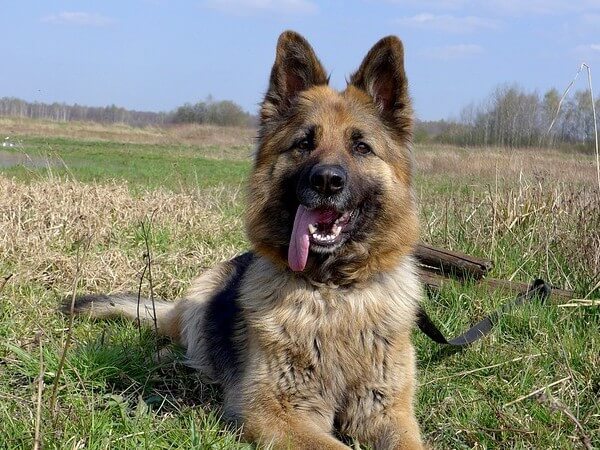
The teething phase is the next stage of your canine’s dental development. Surprisingly, German Shepherd puppies don’t have their puppy milk teeth for that long. So, when do German Shepherds lose their puppy teeth?
Let’s find that out next!
When do German Shepherds lose their baby teeth?
Nine to ten weeks after their baby teeth have grown in, their adult teeth will start to push through as well.
At this point, your German Shepherd puppies should be 12 weeks (3 months) old and they should have a total of 28 puppy teeth with 32 adult teeth expected to come through next.
As they prepare for the adult teeth to grow in, the puppy milk teeth start to fall out. So at 12 weeks old, the German Shepherd puppies will begin the teething stage and the 32 adult teeth will replace their puppy milk teeth.
3. German Shepherd puppies stop teething at 7 to 8 months old
You’re now wondering when do German Shepherd puppies stop teething.
When do German Shepherds stop teething?
The teething stage will begin from month 3 to when the puppies reach 7 to 8 months old so that is a 4 to 5 months timeframe between when the teething stage to when it ends.
It’s important to note that no two German Shepherd puppies are alike. Some puppies could complete the teething phase before they reach 7 to 8 months old, while other puppies could take longer.
4. How long do German Shepherds teethe for: Up to 20 to 24 weeks
For the most part, many German Shepherd puppies will have stopped teething by the time they reach 6 months or 24 weeks old. However, some can take longer so don’t freak out or be surprised. Every dog is different and the dental development stages vary for each dog.
While the puppy milk teeth push through easily, the same can not be said of the adult teeth. It takes time for the German Shepherd adult teeth to push through and grow.
This is especially true of the molars (teeth use to break down hard foods like kibble) at the back of the dog’s mouth. It will take the molars to grow in.
Even if it takes your German Shepherd puppy a little longer to stop teething, by the 8th month, he or she should’ve stopped teeth.
Again, there are cases when the teething doesn’t stop until after the 8th month. This is pretty abnormal, but can still happen. If you’re ever concerned or worried, we highly recommend that you consult with your vet.
Once the teething stops, you’re probably wondering, how many teeth do German Shepherds have. At this point, your German Shepherd dogs should have a total of 42 shiny, white, and strong adult teeth.
When do German Shepherd puppies start teething?
When German Shepherd puppies start teething, there are plenty of signs to let you know that they are teething. You might know from your puppies chewing on furniture, shoes, and everything they can get ahold of.
You might also like: Puppy Has Diarrhea But Still Playful
Signs of teething in German Shepherd puppies
Here are other signs that your German Shepherd puppies are teething:
Tiny puppy teeth
As you’re cleaning the house, you’ll probably find your puppy’s baby teeth on the carpet, floor, jabbed into their favorite toy, or laying around their food or water bowl.
Bloodstains or blood spots on the toys
Teething can be both uncomfortable and painful for your little German Shepherd pup. To get through that pain or as a way of relieving that pain, your puppy may chew their toys more. While they are biting their toys, you’ll see bloodstains or bloody spots. That’s because their gums can be irritated and sore as well.
Chewing more than usual
During the teething phase, you’ll want to keep your pooch in parts of the house that does not contain expensive furniture or items. It’s normal for your German Shepherd puppy to chew a lot during this stage of their dental development stage.
Chewing also helps them cope with the pain. We highly recommend buying some chew toys to keep them biting on the toys and not the valuable items in your house.
Frequent drooling
During this time, your puppy may drool more than usual. Don’t be surprised to find saliva drooling out of your puppy’s mouth.
Behavioral change due to pain of teething
Due to the pain, frequent gum irritation, and discomfort, your German Shepherd puppy may act out. You’ll want to provide them with love, patience, and attention during this time. It’s not easy for them and it’s best to give them chewing toys to keep them distracted.
Inflamed red gums
It’s normal for the gums to become sore, red, and inflamed during the teething stage. The adult teeth are growing in and they are relatively larger so it will disrupt the gums a little.
Teeth are misaligned
Some baby teeth will remain in place as the adult teeth push their way through. Thus, some teeth will be misaligned. This may seem weird, but the baby milk teeth will fall out before your pup knows it.
Mild fever
Like our kids, our German Shepherd puppies can also get a mild fever when they are teething. This is absolutely normal.
Read also: How Do I Know If My Puppy Will Survive Parvo?
Best teething toys for German Shepherd puppies
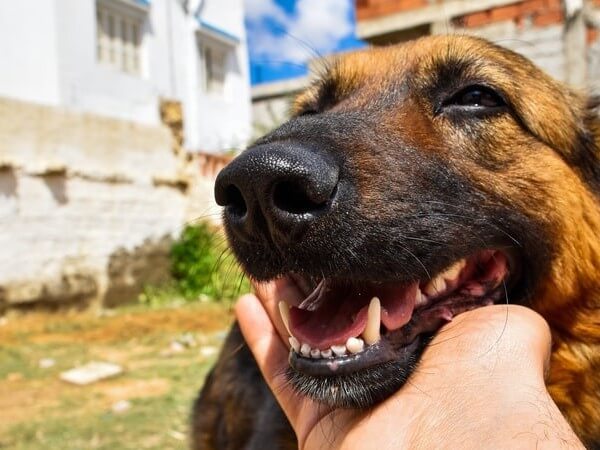
We highly recommend that German Shepherd puppies chew on teething toys when their adult teeth are coming in.
If owners don’t provide them with chew-proof toys during this time, they may resort to bad behaviors like chewing on furniture or things around them. This can be your most expensive shoes, purse, sofa, tables, blankets, beds, and more!
Make sure the toys are strong and durable, not soft or stuffed. The hard and durable chew toys will allow your German Shepherd puppies to satisfy their chewing and provide them soft and sore gums with much-needed relief.
When our dogs were puppies and going through the teething stage, we gave them these teething toys and we believe these are great teething toys for German Shepherd puppies too.
What we like about these teething toys is that they can also work as a treat too.
Our first recommendation based on our puppies’ experience is this one. Your German Shepherd puppies will enjoy getting their teeth on this.
Before we used to give these to our pups, we put them in the fridge first. This makes the toy very cold and is a great way to numb the sore and inflamed gums.
Best of all, you can add treats or put peanut butter inside the toy to mentally stimulate your pups.
The second teething toy we recommend is this one. Instead of rawhide, we give our puppies this dog chew bone which is very durable and long-lasting.
You might be interested in: Best Indestructible Dog Toys for German Shepherd Dogs
How to stop your German Shepherd puppy chewing when teething
Keep in mind that your German Shepherd puppy will want to chew anything and everything he sees because it’s a way to cope with his teething pain. When the baby teeth fall out and the larger adult teeth push through, it can be very painful to your pups.
Therefore, chewing is a coping mechanism for your puppy as it provides him with the pain relief he needs during this excruciating and uncomfortable time.
It’s best to monitor your pups closely or prevent them from entering any rooms with the furniture you don’t want to get ruined. In some cases, you may have to hide items in the house so it doesn’t get destroyed by your pup’s chewing.
It’s normal for a German Shepherd puppy to chew anything he can get his teeth on because it’s his natural instinct during this time. Here are some things owners can do to make them feel more comfortable.
Chew proof your house
When my dogs were puppies and were going through the teething stage, I had to make sure doors to certain rooms with expensive furniture were closed when I wasn’t home. When I was home, I had to put up foldable dog gates to prevent my pups from entering certain rooms.
I also place the stuffed animals in places where my puppies couldn’t reach them. My mom also covered the edge of the bed and sofa with thick blankets.
A teething German Shepherd puppy isn’t afraid to chew through anything so beware!
Provide them with cold treats
Cold treats were my puppies’ favorite. Not only was it delicious and refreshing, but the cold treats helped soothe their inflamed and sore gums. I’d give them frozen blueberries, carrots, pumpkins, and even ice cubes.
Exercise to expend their energy
German Shepherd puppies will have a lot of energy and if they don’t get the exercise they need every day, they will become destructive. Walking your puppy a few times a day and letting them play both outdoor in the yard or inside the house will allow them to burn their energy and they will need a nap or two later.
To keep your dogs safe in the yard, try installing wireless dog fences.
Entertain your German Shepherd puppies
Any puppy or dog with pent-up energy will become destructive. Other than exercise, you can also keep your puppy entertained by playing tug of war, fetch, or catch to distract them from the pain and discomfort of teething.
Provide them with chew toys
Chew toys are a lifesaver when your German Shepherd puppies are teething. Go with chew toys that are safe for your pooch. This means making sure your pooch does not chew rawhide. Rawhide can be a choking hazard and it’s also not safe for dogs.
What other German Shepherd dog owners have to say
Being a part of many German Shepherd online groups, I’ve asked them about their experience with their German Shepherd puppies’ teething stages. Here is what they have to say:
“Buy lots of chew toys! Toys will keep your German Shepherd occupied for hours! You don’t want bored German Shepherds because believe me, they will chew through your precious things while they are teething! Thankfully with chew toys, my puppy didn’t chew things around the house”
“I brought my German Shepherd dogs a variety of chew toys. My two faves are Kong Toys and Nylabone. Go with one that has different textures. It will entertain your pup and they will learn how to use their teeth. Again, Kong Toys with treats are great.”
“If your German Shepherd dog is teething, go with ice cubes! They are the next greatest thing other than chew toys. I put some meat jelly inside the ice cubes and he loved it during his teething phase.”
“Try adding some lavender oil on things you don’t want your German Shepherd puppies to chew. Puppies hate the smell of lavender oil and this prevents them from chewing things you don’t want them to chew.”
“Avoid rawhide at all costs! Go with rawhide alternatives instead! We gave our German Shepherd puppies cheese sticks and bully sticks. We also used the Kong toys. We filled them with peanut butter!”
“We found out our German Shepherd puppies love chewing raw bones. So every time we went to our grocery store, we would buy bones, then freeze them, and after 12 hours give them to our puppies.”
Final thoughts
Teething is not a pleasant time for German Shepherd puppies. It is painful and your puppies will experience sore, inflamed, and red gums. Your puppies just experience their baby teeth coming in and not long after that, their larger adult teeth are pushing through.
The pain tolerance is different for each puppy. Some dogs will chew more than others and chew toys and frozen treats will save the day.
This dental development stage is crucial for your German Shepherd puppy. They will grow in their adult teeth that they will have for the rest of their life. Being present for your puppy will be of tremendous help to him or her. Be sure to shower them with love, understanding, and patience during this time.
DISCLAIMER: THIS WEBSITE DOES NOT PROVIDE MEDICAL ADVICE
The information, including but not limited to, text, graphics, images and other material contained on this website are for informational purposes only. No material on this site is intended to be a substitute for professional veterinary advice, diagnosis, or treatment. Always seek the advice of your veterinarian or other qualified health care provider with any questions you may have regarding a medical condition.
Resources:
https://www.akc.org/dog-breeds/german-shepherd-dog/
https://bmcvetres.biomedcentral.com/articles/10.1186/s12917-020-02281-y

With over five years of specialized experience as an animal writer, my expertise lies in dog nutrition, health, behavior, grooming, and training. I am dedicated to delivering helpful and informative content that caters to the well-being of our furry friends. My primary goal is to empower pet owners with knowledge and ensure our canine companions thrive in health and happiness. In my free time, I love volunteering at local dog rescue centers.
